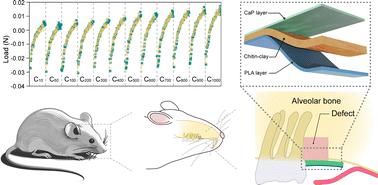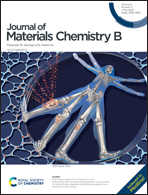Bioinspired triple-layered membranes for periodontal guided bone regeneration applications
IF 6.1
3区 医学
Q1 MATERIALS SCIENCE, BIOMATERIALS
引用次数: 0
Abstract
Barrier membranes have been used for the treatment of alveolar bone loss caused by periodontal diseases or trauma. However, an optimal barrier membrane must satisfy multiple requirements simultaneously, which are challenging to combine into a single material. We herein report the design of a bioinspired membrane consisting of three functional layers. The primary layer is composed of clay nanosheets and chitin, which form a nacre-inspired laminated structure. A calcium phosphate mineral layer is deposited on the inner surface of the nacre-inspired layer, while a poly(lactic acid) layer is coated on the outer surface. The composite membrane integrates good mechanical strength and deformability because of the nacre-inspired structure, facilitating operations during the implant surgery. The mineral layer induces the osteogenic differentiation of bone marrow mesenchymal stem cells and increases the stiffness of the membrane, which is an important factor for the regeneration process. The poly(lactic acid) layer can prevent unwanted mineralization on the outer surface of the membrane in oral environments. Cell experiments reveal that the membrane exhibits good biocompatibility and anti-infiltration capability toward connective tissue/epithelium cells. Furthermore, in vitro analyses show that the membrane does not degrade too fast, allowing enough time for bone regeneration. In vivo experiments prove that the membrane can effectively induce better bone regeneration and higher trabecular bone density in alveolar bone defects. This study demonstrates the potential of this bioinspired triple-layered membrane with hierarchical structures as a promising barrier material for periodontal guided tissue regeneration.

应用于牙周引导骨再生的生物启发三层膜
屏障膜已被用于治疗牙周病或外伤引起的牙槽骨缺损。然而,一种最佳的屏障膜必须同时满足多种要求,而将这些要求结合到一种材料中是具有挑战性的。我们在此报告了一种由三个功能层组成的生物启发膜的设计。第一层由粘土纳米片和甲壳素组成,它们形成了一种珍珠岩启发的层状结构。在珍珠质启发层的内表面沉积了一层磷酸钙矿物层,外表面则涂覆了一层聚(乳酸)层。由于采用了珍珠岩启发结构,复合膜具有良好的机械强度和可变形性,从而方便了植入手术的操作。矿物质层可诱导骨髓间充质干细胞的成骨分化,增加膜的硬度,这是再生过程中的一个重要因素。聚(乳酸)层可以防止在口腔环境中膜外表面出现不必要的矿化。细胞实验表明,该膜对结缔组织/上皮细胞具有良好的生物相容性和抗浸润能力。此外,体外分析表明,该膜不会过快降解,从而为骨再生留出了足够的时间。体内实验证明,该膜能有效地诱导牙槽骨缺损部位更好的骨再生和更高的骨小梁密度。这项研究表明,这种具有分层结构的生物启发三层膜有望成为牙周引导组织再生的屏障材料。
本文章由计算机程序翻译,如有差异,请以英文原文为准。
求助全文
约1分钟内获得全文
求助全文
来源期刊

Journal of Materials Chemistry B
MATERIALS SCIENCE, BIOMATERIALS-
CiteScore
11.50
自引率
4.30%
发文量
866
期刊介绍:
Journal of Materials Chemistry A, B & C cover high quality studies across all fields of materials chemistry. The journals focus on those theoretical or experimental studies that report new understanding, applications, properties and synthesis of materials. Journal of Materials Chemistry A, B & C are separated by the intended application of the material studied. Broadly, applications in energy and sustainability are of interest to Journal of Materials Chemistry A, applications in biology and medicine are of interest to Journal of Materials Chemistry B, and applications in optical, magnetic and electronic devices are of interest to Journal of Materials Chemistry C.Journal of Materials Chemistry B is a Transformative Journal and Plan S compliant. Example topic areas within the scope of Journal of Materials Chemistry B are listed below. This list is neither exhaustive nor exclusive:
Antifouling coatings
Biocompatible materials
Bioelectronics
Bioimaging
Biomimetics
Biomineralisation
Bionics
Biosensors
Diagnostics
Drug delivery
Gene delivery
Immunobiology
Nanomedicine
Regenerative medicine & Tissue engineering
Scaffolds
Soft robotics
Stem cells
Therapeutic devices
 求助内容:
求助内容: 应助结果提醒方式:
应助结果提醒方式:


